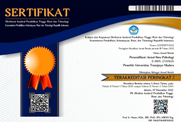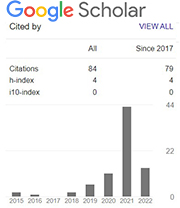Analisis Budaya Organisasi Stasiun Televisi Lokal X di Bandung dengan OCAI (Organizational Culture Assessment Instrument)
Abstract
ABSTRACT
Now, the world has entered globalization, it forms an industry which is determined by the international market. This change has an impact on companies in the media and broadcasting sectors. Now, the company is trying to be at the advance with client-based values. Facing up this rapidly changing environment requires a strategy to adapt. Determination of these strategies can be helped by knowing the organizational culture that is owned by the company. Local television station X is one of the local television stations that has survived for more than 20 years in media and broadcasting sector, To determine a strategy to face the market in the future, this television station needs to know the organizational culture it has, so that it can determine the direction of the preferred organizational culture in the future. OCAI (Organizational Culture Assessment Instrument) is a measuring tool that is often used and precisely in diagnosing organizational culture and organizational effectiveness. This measuring instrument is filled by all employees of television station X from various positions. The results of this study indicate that the dominant organizational culture possessed by this television station is clan culture, but this culture still tends to be weak, this can be due to two dimensions of organizational culture that have different patterns. There is a need for improvement in the communication system to improve work communication relations between management levels at local television station X in order to form a strong corporate culture.
ABSTRAK
Saat ini telah memasuki globalisasi, hal tersebut membentuk industri yang ditentukan oleh pasar internasional. Perubahan ini berdampak pada perusahaan yang bergerak di sektor media dan broadcasting, sehingga saat ini perusahaan berusaha menjadi yang terdepan dengan nilai-nilai berbasis pada klien. Mengahadapi lingkungan yang cepat berubah ini diperlukan sebuah strategi untuk dapat beradaptasi. Penentuan strategi tersebut dapat terbantu dengan mengetahui budaya organisasi yang dimiliki oleh perusahaan. Stasiun televisi lokal X adalah salah satu stasiun televisi lokal yang bertahan setelah kurang lebih 20 tahun berkiprah dalam sektor media dan broadcasting, untuk menentukan strategi untuk menghadapi pasar dimasa yang akan datang, maka stasiun televisi ini perlu mengetahui budaya organisasi yang dimiliki, sehingga dapat menentukan arah budaya organisasi yang dilebih disukai dimasa yang akan datang. OCAI (Organizational Culture Assessment Instrument) merupakan alat ukur yang sering digunakan dan tepat dalam mendiagnosa budaya organisasi dan efektifitas organisasi. Alat ukur ini diisi oleh seluruh karyawan stasiun televisi X dari berbagai jabatan. Hasil dari penelitian ini, bahwa budaya organisasi dominan yang dimiliki oleh stasiun televisi ini adalah budaya clan, tetapi budaya ini masih cenderung lemah, hal tersebut dapat disebabkan dua dimensi budaya organisasi yang memiliki pola berbeda. Perlu adanya perbaikan dalam sistem komunikasi untuk memperbaiki hubungan komunikasi kerja antara level manajemen di stasiun televisi lokal X agar dapat membentuk budaya perusahaan yang kuat.Keywords
Full Text:
PDFReferences
Amali, L. N., Hadjaratie, L., & Suhada, S. (2018). The Influence of Organizational Culture in Application of Information Technology Governance. Journal of Information Systems Engineering and Business Intelligence, 4(1), 1–10. https://doi.org/10.20473/jisebi.4.1.1-10
Baniyassen, S. O. A. (2017). Media Globalization. MAGNT Research Report, Vol.4 (2)(April), 88–90. https://doi.org/1444-8939.2017/4-2/MRR.11
Cameron, K. S., & Quinn, R. E. (2011). Diagnosing and Changing Organizational Culture Based on the Competing Values Framework (Third edit). United States of America: Jossey-Bass.
Carcia, M. S. M., Transilvanus, V. E., & Parera, C. J. T. (2020). Analisis Budaya Organisasi Dengan Menggunakan Metode Organizational Culture Assessment Instrument (OCAI) Pada Koperasi Obor Mas Maumere. Jurnal Projemen, 7(1), 1–20.
Channappa, S. (2012). Role of Vision, Mission, Strategy and Leadership in Shaping Culture. International Journal of Research in Management, 5(2), 12–24.
David, S. N. J., Valas, S., & Raghunathan, R. (2018). Assessing Organization Culture – A Review on the OCAI Instrument. International Conference on Management and Information Systems.
Jung, S. C. (2014). The analysis of strategic management of samsung electronics company through the generic value chain model. International Journal of Software Engineering and Its Applications, 8(12), 133–142. https://doi.org/10.14257/ijseia.2014.8.12.12
Ližbetinová, L., Lorincová, S., & Caha, Z. (2016). The Application of the Organizational Culture Assessment Instrument ( OCAI ) to Logistics Enterprises Primjena instrumenta procjene organizacione kulture ( OCAI ) na logističke tvrtke. Naše More, 63(3), 170–176. https://doi.org/10.17818/NM/2016/SI17
Nester, W. R. (2010). Globalization A Short History of the Modern World. New York: PALGRAVE MACMILLAN.
PPID, K. B. (2016). Daftar TV lokal di kota bandung. Retrieved from https://ppid.bandung.go.id/knowledgebase/daftar-stasiun-tv-lokal/
utra, I. A. G. S. (2017). Analisis Budaya Organisasi Menggunakan Model OCAI ( Organizational Culture Assessment Instrument ) pada Universitas XYZ. Konferensi Nasional Sistem & Informatika, 452–457. Bali: STMIK STIKOM.
Rakhman, A. (2018). Analisis Budaya Organisasi Menggunakan Metode Organizational Culture Assessment Instrument (OCAI). Jurnal Ilmu Manajemen Mulawarman, 3(4).
Šahić, E., & Stupar, S. (2014). Employee Perceptions of Organizational Culture and Individual Values Based on Examples of Companies in Bosnia and Herzegovina. International Journal of Business and Social Science, 5(7).
Shahzad, F., Luqman, R. A., Khan, A. R., & Shabbir, L. (2012). Impact of Organizational Culture on Organizational Performance: An Overview. Interdisciplinary Journal of Contemporary Research in Business, 3(9), 975–985.
Tănase, I. A. (2015). The Importance of Organizational Culture Based On Culture Transfer. Proceedings of The 9th International Management Conference, 848–852.
Wijaya, N. P. N. P. (2016). Pengelompokkan Kultur Budaya Fakultas Menggunakan Metode Organizational Culture Assessment Instrument (Ocai). Jurnal Manajemen Dan Bisnis: Performa, XIII(1), 41–54. https://doi.org/10.29313/performa.v0i1.3516
DOI: https://doi.org/10.21107/personifikasi.v11i2.9103
Refbacks
- There are currently no refbacks.
Copyright (c) 1970 Fauziyyah Sholeha Tunnisa, Anissa Lestari Kadiyono

This work is licensed under a Creative Commons Attribution 4.0 International License.


Personifikasi by Universitas Trunojoyo Madura is licensed under a Creative Commons Attribution 4.0 International License.










